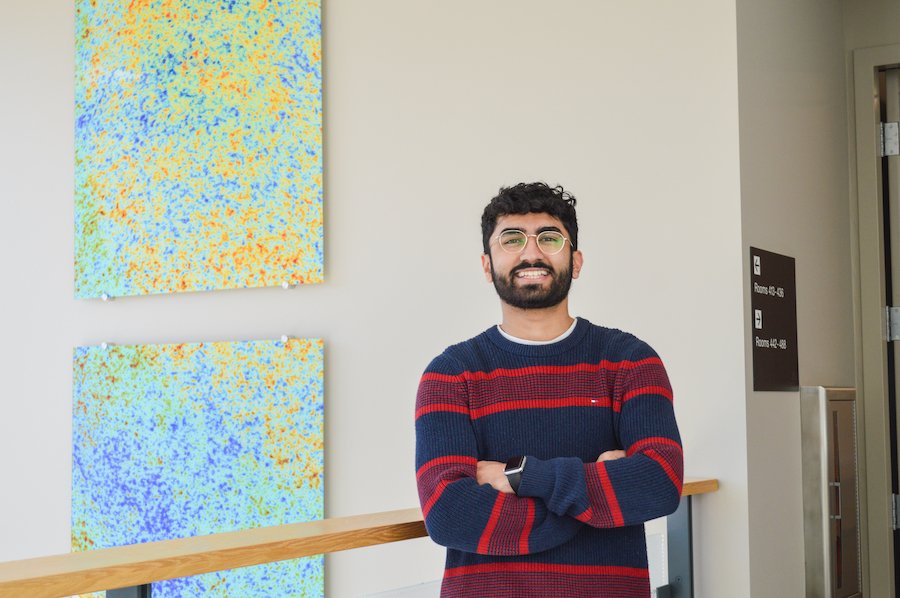CSE senior Akshay Naik’s undergrad journey include research and mental health advocacy

Don’t be afraid to branch out and reach out, computer engineering student says
May 2, 2023
Akshay Naik has sent a lot of cold emails. The University of Minnesota College of Science and Engineering senior, who hails from Minnesota, spent the latter half of high school reaching out to people in various professions in an attempt to figure out what he wanted to do with his life.
Through all this investigation (and the help of a family friend studying aerospace engineering at the U of M), Naik met CSE Professor James Flaten. Flaten is the associate director of the MN Space Grant Consortium, a NASA-funded educational program that raises awareness of all things space-related. He showed Naik around his lab and even let him tag along on his students’ high-altitude balloon launch.
That exposure, plus the appeal of staying close to home, propelled Naik to enroll at the U of M. He ended up working in Flaten’s lab, in addition to having a slew of other research experiences, throughout his undergraduate years in CSE.
Now, he plans to pursue a Ph.D. in computer engineering at the University of Illinois Urbana-Champaign in the fall. In this Q&A, Naik discusses the highlights of his CSE journey, his passion for mental health, and why he strives to be an expert in his field.
What made you land on computer engineering as a major?
During my experience in Dr. Flaten’s lab, I was put in charge of the electronics devices on the payloads. I was exposed to circuitry very, very early, and a lot of the payloads that we attach to the balloons are programmed in this language called Arduino, which is a very low-level language that allows you to learn the fundamentals of coding. I realized I wanted to pair up hardware with programming, so I ended up choosing computer engineering my second semester here.
What stands out to you about your experiences in CSE?
I’ve been really grateful for the opportunities that I was presented with throughout CSE. One thing that I really appreciated was how easy it is to gain access to faculty members. If I really wanted to pursue something, it was super easy to get a hold of someone and make it happen.
Another thing is that I'm very passionate about mental health. My senior year, I joined the Science and Engineering Student Board. As the Mental Health Committee Director, I was able to start a lot of initiatives regarding mental health, make resources more accessible for students, and host events that prioritized mental health and de-stressing during finals and midterms. It’s something I really enjoyed because I felt like for the first time, I could contribute to actual change at the U.
What made you decide to pursue a Ph.D. after graduation?
I've had a lot of research experiences during my undergraduate years. Working with Dr. Flaten propelled me into doing research with the Massachusetts Institute of Technology (MIT) over a summer. During that experience, I worked on the MOXIE device for the Perseverance Rover on Mars, which is currently working to produce oxygen from the Martian atmosphere for burning fuel and breathing. Then, I started doing research for another lab in the physics department in CSE that’s associated with CERN, a Europe-based particle physics organization.
The cherry on top for me was when I did an internship at Lockheed Martin last summer. Lo and behold, everyone I was working with had a Ph.D. I realized that the people who are calling the shots in science are the people who are the experts. Based on that, I decided I wanted to get a Ph.D. and reach that level.
What advice would you give to CSE students?
Don't be afraid to reach out. Don't be afraid to send that cold email to a professor. If there is something you really want to pursue, faculty at the U of M are there to help you. Another thing I would say is that just because you're a CSE student doesn't mean you have to only do CSE stuff. It's good to add dimension to who you are. Branch out of CSE and understand that you're part of a bigger university and you're part of a bigger community that transcends science and engineering.
Interview by Olivia Hultgren
If you’d like to support students and programs in the University of Minnesota College of Science and Engineering, visit our CSE Giving website.